Cameo is an American funk band that formed in 1974. Cameo was initially a 14-member group known as the New York City Players; this name was later changed to Cameo.

Tha Last Meal is the fifth studio album by American rapper Snoop Dogg. It was released through No Limit, Doggy Style, and Priority Records on December 19, 2000. It was his third and final studio album released on No Limit, marking this record his first album on his newly founded label, called Doggy Style, alongside Priority in the United States. The album title makes reference to being the last record partially owned by his former label, Death Row Records. The album was produced by Dr. Dre, Timbaland, and Soopafly, among others. The album includes four official singles: "Snoop Dogg ", "Lay Low", "Loosen' Control", and "Wrong Idea". The album was generally met with positive reception.

Word Up! is the 13th studio album by American funk group Cameo, released in 1986. The album reached number 1 on the Top R&B/Hip-Hop Albums chart, number 8 on the Billboard Pop Albums chart, and was certified Platinum by the RIAA for sales of over 1 million copies. It took Cameo to their highest level of popularity, and solidified them as one of the most successful bands of the 1980s. The album includes three of their biggest hit singles, "Word Up!", "Candy", and "Back and Forth".
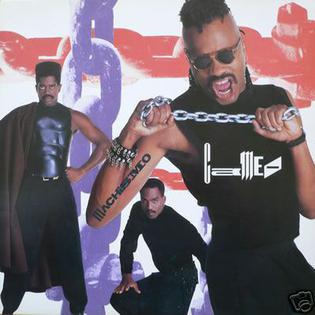
Machismo is the funk group Cameo's 1988 follow up to their album Word Up!. It includes the hits "You Make Me Work" and "Skin I'm In". The album reached No. 10 on the Billboard R&B chart, No. 56 on the Billboard 200 Pop Albums chart, and No. 86 on the UK albums chart. It was certified Gold by the RIAA for sales of over 500,000 copies.
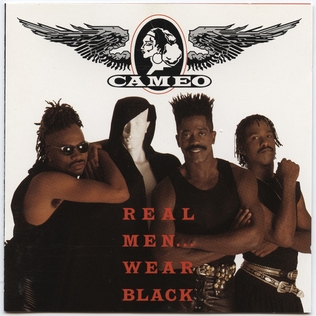
Real Men... Wear Black is a studio album by the funk group Cameo released in 1990 on Atlanta Artists/Mercury Records. The album reached No. 18 on the Billboard Top Soul Albums chart.

Single Life is a 1985 album by the funk group Cameo. The album reached No. 2 on the Top R&B/Hip-Hop Albums chart and No. 58 on the Billboard Pop Albums chart. It contained the hit singles "Attack Me With Your Love", which reached No. 3 R&B, and the title track, "Single Life", which reached No. 2 R&B. "Urban Warrior" was the group's foray into the emerging Hip-hop scene. The videos for both singles included appearances from popular television soap opera actors and were tied together by a particular storyline; with the title track’s video being a continuation of the story that started in the "Attack Me With Your Love" video. The album was Cameo’s seventh to be certified Gold by the RIAA for sales of over 500,000 copies.
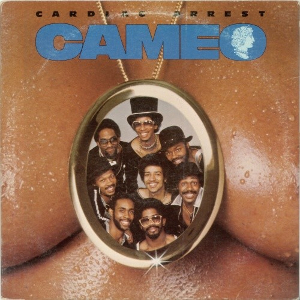
Cardiac Arrest is the debut album by American funk band Cameo.

Ugly Ego is the third studio album by American funk band Cameo, released in September 1978.

Secret Omen is the fourth studio album by American funk band Cameo, released in June 1979. It was their first of nine albums, and the first of five consecutive albums to be certified gold in the US for sales of over 500,000 copies.
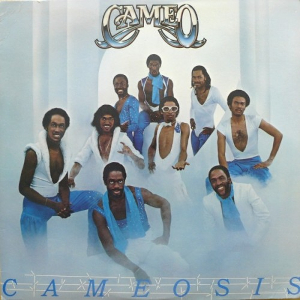
Cameosis is the fifth studio album by American funk band Cameo, released in April 1980.

Feel Me is the sixth album by the funk band Cameo, released in 1980.

Knights of the Sound Table is the seventh album by the funk band Cameo, released in 1981. It reached number 2 for 3 weeks on the Top R&B/Hip-Hop Albums chart, number 44 on the Billboard 200 chart), and was the band’s fourth consecutive album to be certified Gold by the RIAA for sales of over 500,000 copies. The album spawned two hit singles: "Freaky Dancin'" and "I Like It" (which reached number 25 R&B. The track “Don’t Be So Cool” featured a guest appearance by former Labelle member Nona Hendryx and also received airplay on R&B stations at the time. Hendryx joined Cameo for a performance of the song on Soul Train that first aired on June 20, 1981.

Alligator Woman is a 1982 album by the American funk band Cameo, released by Casablanca Records. It is the group's eighth studio album, and the first released after group leader Larry Blackmon reduced the band from 11 members to 5 (himself, Tomi Jenkins, Nathan Leftenant, Charlie Singleton, and Gregory Johnson. Alligator Woman combined Cameo’s traditional funk with elements of rock and new wave, and was the band’s fifth consecutive album to be certified Gold by the RIAA for sales of over 500,000 copies. The cover artwork model is the Canadian singer/model Vanity.

Style is the ninth album by the funk band Cameo, released in 1983. It was their first album to introduce their Atlanta Artists label, with which they maintained their distribution through Polygram Records.
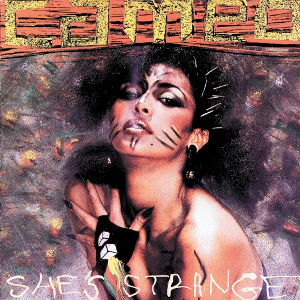
She's Strange is the tenth album by the funk band Cameo, released in 1984. It reached number 1 on the Billboard R&B Albums chart, number 27 on the Billboard Pop Albums chart, and was certified Gold by the RIAA for sales of over 500,000 copies.

The Best of Cameo is a greatest hits album by the funk group Cameo, released in 1993. In total, nine albums are represented by 14 tracks. The Best of Cameo, Volume 2 was released three years later.

Anthology is a 2-disc greatest hits album released by the funk/R&B group Cameo in 2002. The collection is arguably the best representation of Cameo released to date, containing 23 of their 26 Top-40 R&B hits, though the top 5 single "You Make Me Work" is not present. This collection was repackaged and retitled as Gold three years later.

Put Yo Hood Up is the third studio album by American Southern hip hop group Lil' Jon & the East Side Boyz. It was released on May 22, 2001 through BME Recordings/TVT Records. Recording sessions took place at Patchwerk Recording Studios, The Zone, Sound Lab, Blue Basement Recordings and Dangerous Music in Atlanta, at Streetlight Studios and The Cutting Room in New York, at Q95.5 in St. Louis, at Pyramid Sound Recording Studios in Ithaca, and at BME Studios. Production was handled by Lil' Jon, Danny D, Mr. Collipark and Paul Lewis. It features guest appearances from Chyna Whyte, Oobie, Too $hort, 6 Shot, 8Ball & MJG, Big Kap, Bohagon, Don Yute, Jazze Pha, Khujo, Kilo Ali, Ludacris, M.O.P., Quint Black, Skyy, The Nation Riders, Three 6 Mafia and YoungBloodZ, with cameo appearances from Carolyn, DJ Hershey, Leah, Mimi, Nathan Smith and Sincerley.

King of Stage is the debut solo album by American R&B singer Bobby Brown. Following his exit from New Edition, and at 16, Brown signed a solo deal with the group's label MCA Records, which had earlier promised Brown a solo deal if he decided to leave New Edition. His first solo album was released in 1986.

Dance!...Ya Know it! is a remix album by American R&B singer Bobby Brown, released in 1989. The album features remixes of various songs from his King of Stage and Don't Be Cruel albums as well as "On Our Own", Brown's hit single from the Ghostbusters II soundtrack. "Every Little Hit Mega Mix", a medley of "Every Little Step", "On Our Own", "Don't Be Cruel", and "My Prerogative", was released as a single to promote the album but was not included on the album itself. The UK and European version of the megamix was titled "The Free Style Mega-mix" and was produced by Rita Liebrand; the Australian version, "The 'Every Little Hit' Mix", was released as a B-side on the European version of the "Roni" single.

















